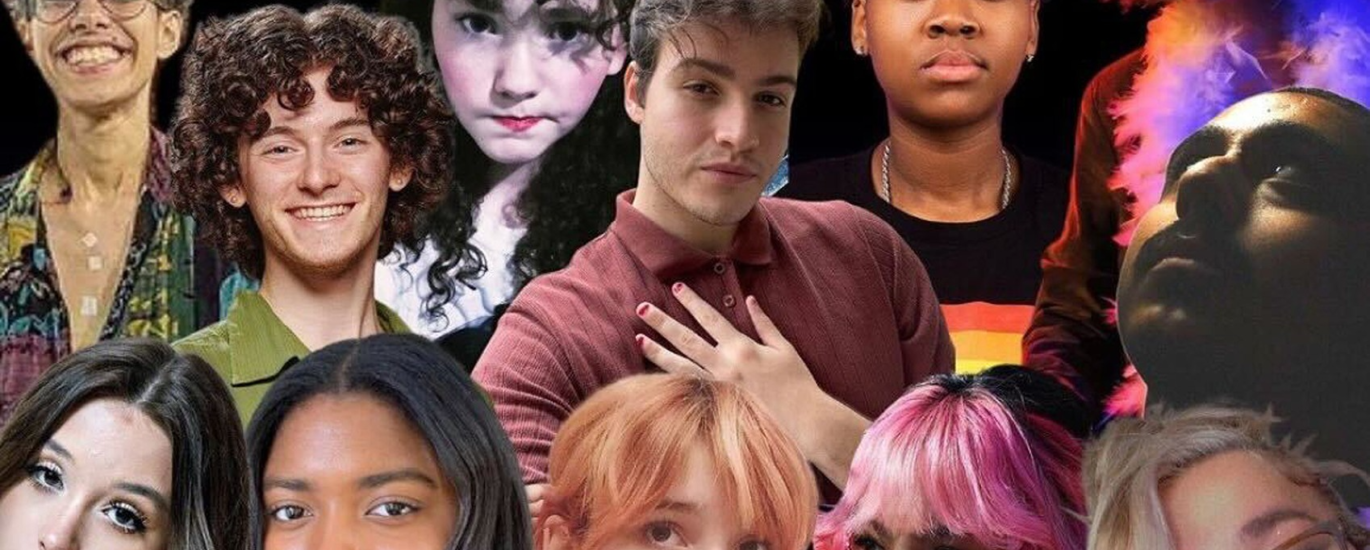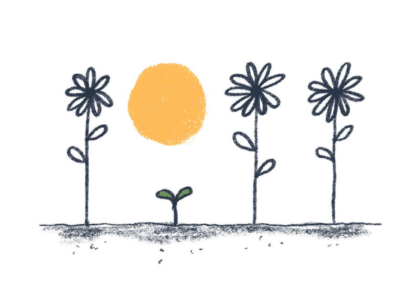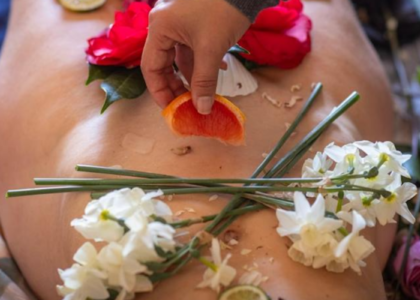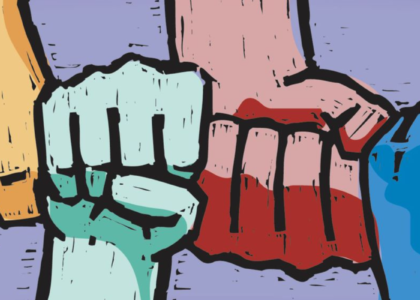“There are just so many ways to be trans and happy”
Amy is joined by creators Alex Masse & Frankie Gunn to discuss their podcast, I’m Feeling Queer Today, and explore the critical importance of listening to queer youth, plus Alex and Frankie share guidance for those questioning their identity and for those interested in becoming better allies to the LGBTQIA+ community.
Our Guests
Alex Masse & Frankie Gunn
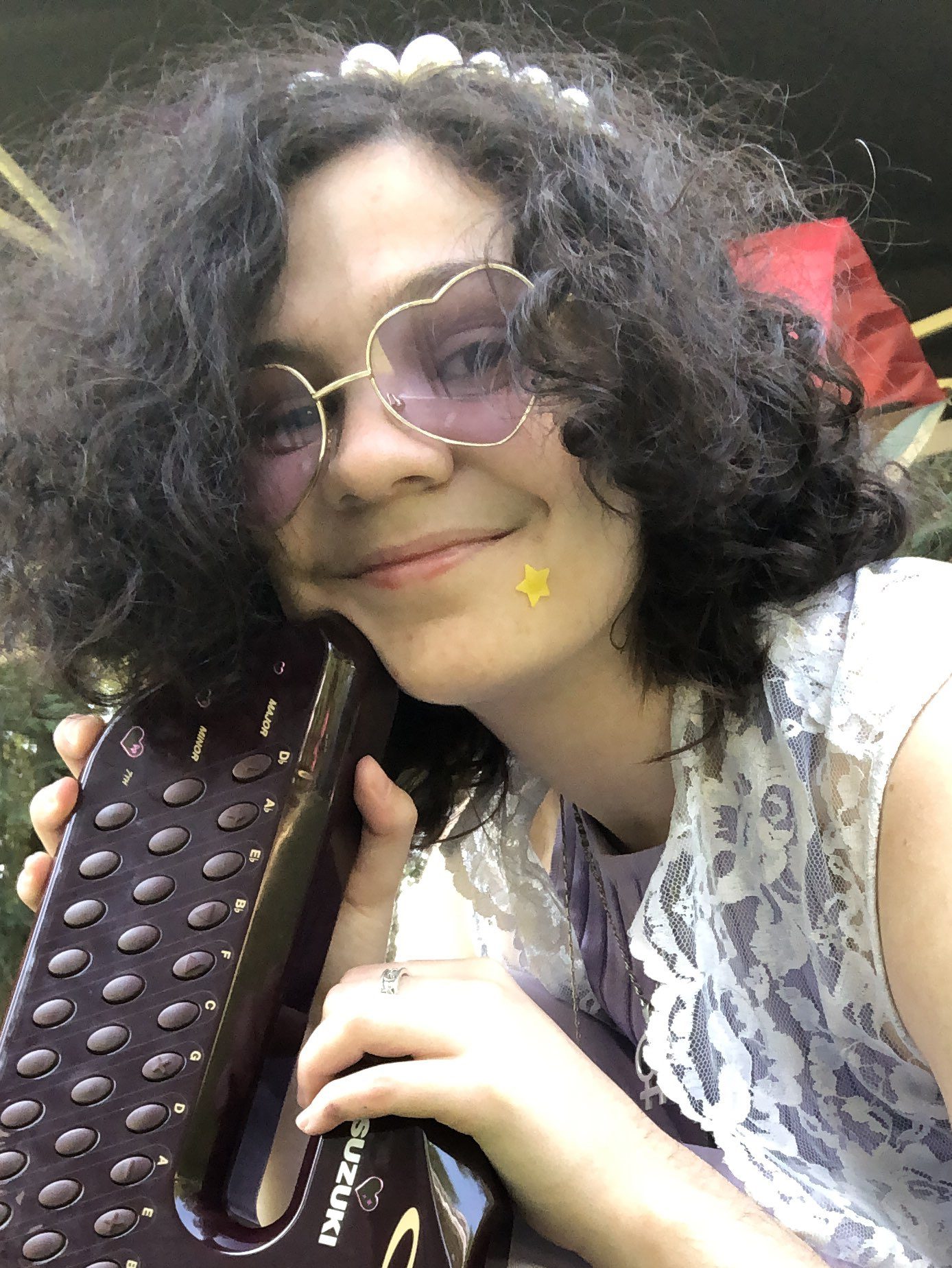
Alex K. Masse is a writer, musician, and communications specialist from what is colonially known as British Columbia. Their work has been seen everywhere from the Scholastic Writing Awards to Autostraddle, as well as in collaboration with Penelope Scott, Vancouver Pride, Simon Fraser University, and more. They’re also a neurodivergent nonbinary lesbian, which greatly affects their process. When not writing, they’re making music, and when not making music, they’re writing. Occasionally, though, they can be seen working on their degree, or cozied up with their cat.
+++
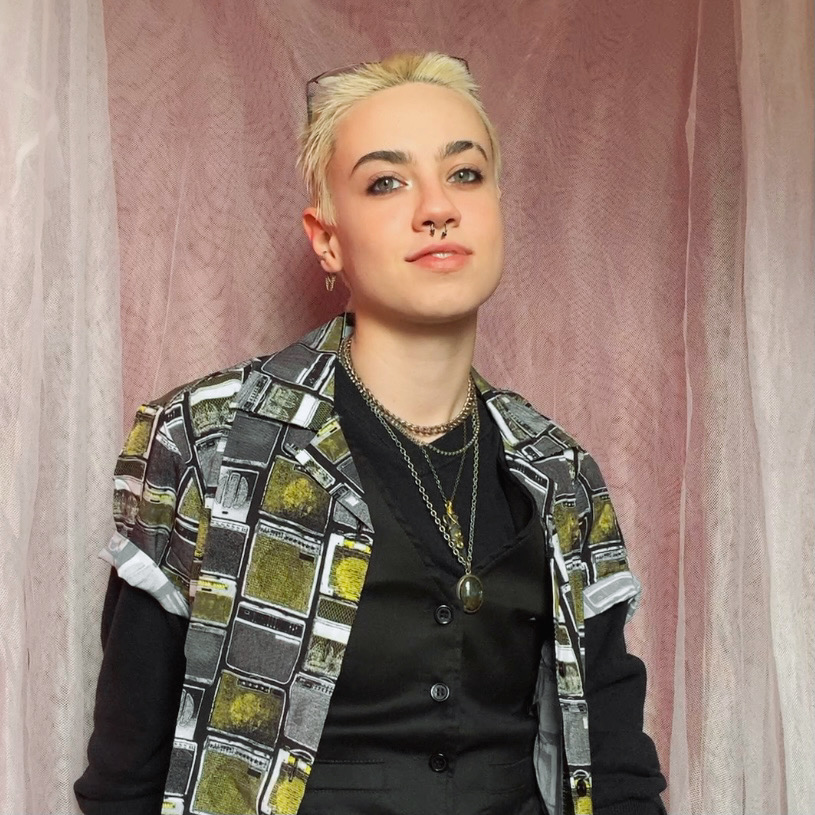
Frankie Gunn is a transmasc interdisciplinary artist, musician and producer, currently working as a gardener in the Hudson Valley in upstate New York. Having not attended a traditional 4 year college, Frankie has acquired an a la carte education, doing everything from hairdressing and sound engineering to farming and agriculture. The thread that ties their work together is a hands on approach and a love of all things beautiful.
The Discussion
AA: Recently, I met an older woman who follows my work and is a self-described feminist, and she was very excited to talk with me about feminism. After a few minutes of chatting about women’s empowerment, she said, “What do you think of all the trans issues going on right now? How are you handling them on the podcast?” So I answered, “The way I’m handling them on the podcast is by listening as trans people speak for themselves.” I think she was looking for a more controversial answer, but she said, “Oh, okay, I guess that makes sense.”
We humans do this a lot. Sometimes white people pontificate about people of color without listening to people of color. Sometimes cisgender men preach their opinions about the nature and needs of women, instead of simply listening to women. And all too often, cisgender, straight people talk themselves into knots about queer folks instead of just listening to what queer folks are saying about themselves. So today I want to introduce you to a project called The Future Perfect Project.
The homepage on their website says, “While lawmakers are working overtime to pass laws and propose measures to limit the self-expression of queer youth in schools and communities, The Future Perfect Project is encouraging the next generation to speak their truth and sing their songs of tomorrow. Now more than ever, we need their vision of a better world.” So, I am so excited to welcome to the podcast today two contributors to The Future Perfect Project, Alex Masse and Frankie Gunn.
Welcome, Alex and Frankie. Thank you for having us. We’re super excited to be here.
FG: Yeah, absolutely. This is an awesome opportunity. I appreciate you having us on your show.
AA: Thank you so much. So I’m wondering if we can start out by having each of you just introduce yourselves a little bit. Tell us where you’re from, a little bit about your family of origin, maybe your education, and some kind of maybe fundamental things that brought you to be the person that you are today.
And maybe we’ll go, should we go in alphabetical order and ask Alex first?
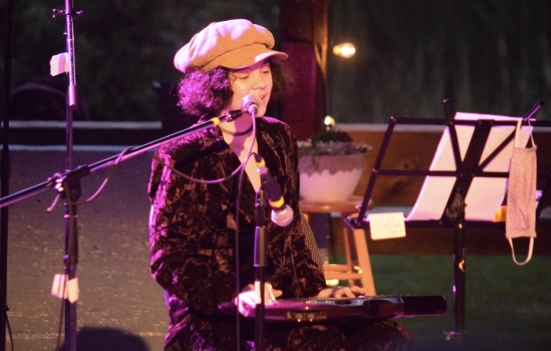
AM: Sure. Okay, hi, I’m Alex K. Masse, I use they/them pronouns, and I am a non-binary femme lesbian from what is colonially known as Surrey, B.C. For the Americans, that is just outside Vancouver, B.C. I first started working with The Future Perfect project probably a couple years ago. I knew people who worked with it, and we just kind of connected there, and I’ve had the opportunity to do a few different projects with it. Including every iteration of the podcast cohort, and also the Performing Arts Intensive that they did a couple years back. It’s always something new and exciting with The Future Perfect Project. I am tragically about to age out of the age range for them. But yeah, I’ve been very, very privileged to have the experiences I have had with them.
I’ve been a creative for pretty much as long as I can remember. I started as a writer, and then I became a musician. And over my time as a communication major at Simon Fraser University, I’ve picked up a bunch of other means of storytelling, including podcasting. So I was really excited about I’m Feeling Queer Today, and I’ve worked on other podcasts before that and since. And yeah, it’s just a form of storytelling that I am absolutely in love with.
I primarily consider myself a writer and musician, and both of those art forms have kind of grown and shifted over the years as I kind of find myself. As a writer, I primarily consider myself to be someone who does poetry and prose, though I’ve also really gotten into theater over the past few years. I actually have a play getting a staged reading downtown. That’s really exciting, a little frightening, but also really exciting. And I’m also a musician! I actually make stuff under the alias Fairything. I have a lot of influences there. I started as a kid who really liked concert band a bit too much. And now I have my own like DIY recording studio in my room. I have a bunch of synths on my wall over there.
I feel like definitely my creative journey has been heavily shaped by my experiences as a queer and disabled individual, but I wouldn’t have it any other way. I really like telling stories about queerness and neurodivergence, and all the ways that I’ve been made to feel different, and just kind of making them stories of celebration and resilience, because I didn’t have a lot of those when I was growing up. So yeah, that’s me: Alex K. Masse, Fairything in some places, writer, musician, communications person, and slightly more than occasional podcaster.
AA: Thanks, Alex. That’s great.
Okay. How about you, Frankie?
FG: I’m Frankie Gunn. My pronouns are also they/them. I grew up in Hudson Valley, New York, and I am still here. I have done a lot of odd jobs and weird little things. I like to think of myself as someone that does an a la carte education. I pop around to whatever I can get my hands on. I did a course on audio engineering and sound production when I was in high school. I went to cosmetology school after high school, worked in a bakery, worked on a farm, and am working as a gardener now.
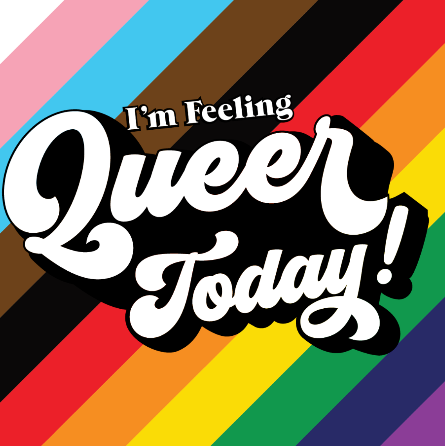
Similarly to Alex, I’ve been a creative my whole life. Everything from 2D and 3D visual arts to music to podcasting. The cosmetology school had me doing hair for a while. I do anything I can get my hands on, truly. One of my favorite parts about life is getting to see and be around beautiful things. And I like to think of myself as a curator of such, hence why I found myself in gardening now and why I think storytelling—like this on podcasts, like I’m Feeling Queer Today—are so important because it’s highlighting the beauty of the life of queer youth and I think that that’s a really, really special thing. I feel ridiculously fortunate to have been a part of the process of facilitating these stories and also helping people tell their own stories, as well as getting the chance to tell my own.
AM: This is so random, but I can totally see you as a gardener. That sounds like something where you would be thriving.
FG: I appreciate that.
AA: It’s a fun job. That is one of the most diverse resumes I’ve ever heard of, actually. You have done a very wide variety of jobs. That’s super cool.
FG: Yeah, I try everything.
AA: I love it. So great.
AM: That might be a generational thing, honestly. Every young queer I know is just like, Yeah, I do eight million things. I’m a poet and a therapist, or I do this and that. Like, it’s always like a combination of things.
FG: The poet therapist combination, I feel like, is ridiculously common, too.
AM: Yeah. I once did a show with a guy who was a musician and also worked in, like, kayaks or something. I don’t know. It’s really fun. The range. I love it.
AA: Okay, well, let’s start with a very, very broad question. You two both know Celeste Lecesne, and our episode last week was with Celeste. And Celeste mentioned, like, when you talk to Frankie and Alex make sure that you ask specifically about patriarchy, because they both can talk about it a lot. I wouldn’t have put you on the spot like this, but I wonder if we can start there. I mean, the podcast is called Breaking Down Patriarchy, right? And it is this kind of broad umbrella under which all of the episodes in some way fall under that umbrella. So, yeah, I’m so curious to hear how you would describe structural patriarchy and maybe the impact that it’s had on people, on maybe your life individually, or your community, or just how you’ve experienced the impact of patriarchy in your life.
FG: How has it not impacted everyone’s life? I think that’s the point that I’m at; it’s everywhere, it’s pervasive. It’s something that you constantly got to be unlearning and critiquing and paying attention to. I mean, everything from being a young child and being taught the box that you fit in, to being an adolescent and young adult and dealing with things like sexual harassment and sexual abuse and people’s stupid opinions and the fact that nowadays everybody has a voice because of the internet, so you get to see everyone’s thoughts on everything all the time, and that really drills into your brain the type of world that you live in. It’s hard to avoid, and I think especially Alex and our generation… we’re steeped in it, and we have been since we were, I mean… I got my first iPod when I was 12, and I had access to the internet. You start seeing some vile stuff.
AM: Yeah, I feel like the patriarchy…it goes so deep, and I could just talk for hours about it. As a non-binary person, as a non-binary lesbian, I feel like the patriarchy has played such a huge role in helping me discover myself, because it constantly has made me feel incredibly alienated. Being a lesbian alone is isolating. Being trans on top of that is just like, you are constantly punished. You are othered time and time and time again. And the patriarchy has a huge role in a lot of queer people’s journeys because of the way that we are often exiled from the world because of how we present ourselves and our desires and our genders. It’s painful. It’s a very quick means of realizing that you’re different, but it hurts.
FG: And it’s so interesting because like, I myself am gender non-conforming transmasculine. Other people know that there’s something going on with you long before you do. Really? And they can pinpoint it and you don’t even know, you don’t realize till you’re ten years down the line. At that point they’ve cut you out of everything.
I have the really interesting experience of… I’m on testosterone. I’ve been medically transitioning for almost a year now. I am starting to pass more as male, even though that has never been the goal, and it is really so baffling seeing how people really, truly do treat me differently.
Not even like four years ago, I was still out as non-binary, gender non-conforming, transmasc. But I presented a very different way. I had shoulder length hair, I was in cosmetology school doing lots of makeup, goofing off, having a good time, and I liked the way that I presented then, and then it didn’t work for me, and I switched it up, and I get listened to so much more. It’s ridiculous.
I work at a place where all my coworkers are cis men and I’m very critically aware that the way that I present myself at my job is in good part the way that I’m taken seriously, the way that my opinions are listened to, the way my words are heard. The pitch of my voice can determine whether or not someone’s going to take my questions seriously.
the patriarchy has a huge role in a lot of queer people’s journeys because of the way that we are often exiled from the world
That being said, there’s another queer guy at my work but he still is a cis man. And it’s just really interesting having gone from one end of the spectrum to the other. I have played with my presentation and my experience of the world quite a lot. And for anyone who could possibly deny that there’s a difference in the way that you present yourself, whether or not you’re seen as more masculine or more feminine are just in denial, because I have experienced it firsthand, and it is a stark contrast.
AM: Yeah, a lot of transmasculine people have…it’s like, even phone calls, like, once your voice hits a certain pitch, and they stop ma’aming you all the time, and they suddenly take you way more seriously.
AA: This is reminding me of a podcast episode that we did in Season One, really early on. And the debate between, so, as a cisgender woman, that choice of whether to—knowing that that’s true, and it’s incredibly validating to hear it from someone who has experienced both, but like, me making the choice—I naturally have on the higher end of a voice pitch and making the choice of whether I should lower my voice in order to be taken seriously or whether I should keep it as it is naturally and then demand that people do take me seriously so that we at least do a little bit to retrain the world to take voices that are higher pitched more seriously or, you know, feminine voices.
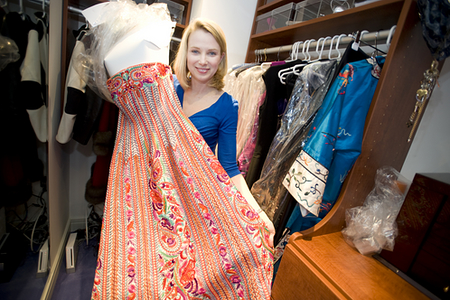
And it’s the same with dress, right? If you think, like I was talking with a woman who—I think it was Marissa Mayer at Yahoo. She was like the CEO of Yahoo for a little while—and she wore pink frilly dresses to work instead of dark suits. Cause she’s like, yeah, you’re going to have to get used to this, to this feminine presenting person in a position of power, which is again, it’s a brave choice because cisgender women in order to be taken seriously, in order to have people be able to picture them in a position of leadership, they have to present in a certain way. It’s tricky.
AM: Yeah, it’s pretty much just like this kind of almost de-gendering of women. It’s like, women can be boss, women can wear pants in relationship, and we’re not fixing anything. We’re just punishing them for being feminine. That’s still a problem. It’s just kind of equating masculinity and power together. It just keeps putting femininity in this box of like, Yeah, girls can be frilly, but frilly and, like, powerful are not ever in the same sentence. Like, the fact that that’s still an issue, the fact that how we present it is how we’re taken seriously across the gender spectrum.
And it always comes down to femininity being punished, whatever gender you are. And once people like Frankie and I show up, it gets even worse because then there’s just so much more to interrogate.
FG: It becomes so much more nuanced and therefore creates the opportunity to do so much deeper thinking. And when you’re stuck in that box already, it’s really hard to get your foot on the outside, let alone your whole body. When you have been subscribing to what’s been on your birth certificate since you’ve been an infant without questioning it, it’s really hard to see other people who have questioned it and made their own decisions and found their own truth and not have a little bit of a brain break.
AM: Yeah, I think that a lot of people just go through their lives never having questioned their genders. And, you know, sometimes that’s almost enviable. It’s like, wow, you never had an era where, like, you were completely breaking down because you hated what puberty was doing to your body. Sheesh, wish that was me. Can’t relate to you.
I’ve threatened certain parts of my body with straight up eviction, like, if my chest gets bigger, I’m cutting it off. If this changes, I’m losing my mind. If this changes, then I’m going to change this. And again, there are so many factors that come into that, obviously, like, I don’t try to waste time bothering with the whys and stuff, but like the fact that there are people who have never had to question the nuances of their presentation in that patriarchal context, it’s enviable.
AA: Yeah. I mean, I’m probably the generation of your parents and it is a complete mind shift. And I think in a really, really valuable way, even for someone who like is cisgender, but like you’re saying, like to hold a mirror up or to make people confront, not just the biases, not just the unkind biases and bigotry, but the actual foundations of everything the world is built on. And I was thinking the other day about, I’ve talked before about reform feminism versus radical feminism and how radical just means ‘from the root’, right? Radical means root. So a radical feminist, it isn’t necessarily that they’re militant or violent, but it just means they want to pull something up from the very foundation, get rid of it, and then start again.
And I was thinking—I mean, you can tell me if you agree or disagree—but I was like, oh, then a trans person would be the most radical. Because the notion of that is digging under the foundations and saying, no, no, no, no, it goes even deeper than that. We are going to get rid of everything with no pressure and see what like each individual human being, what their feeling and is, and what their expression is and have it be open land with no preconceived notions at all.
So anyway, does that check out in terms of your mentality?
FG: Absolutely. I mean, questioning your gender and messing with your gender expression is not just for trans people. It is for literally everyone. Like, you can be as cis as anyone else and, I don’t know, hang out in the bathroom, look in the mirror, throw on like a fake little mustache and put your hair up all short and just be like, what if? And that’s fun. You can play with it.
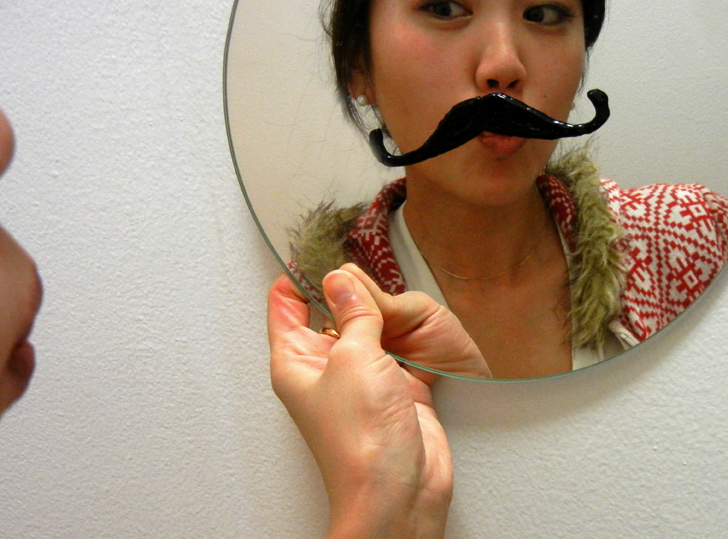
That’s the wonderful thing, I think, about gender in general. And this is something that one of our peers on the podcast, Ariella, has talked about quite a bit. Trans joy and trans play is infectious and is for everyone. Like, playing with your expression and your presentation and even the lens through which you see yourself, whether or not you’re cisgender, trans, or any range of sexualities, is actually a really important step to just simply understanding yourself, even if you come back around to where you started and just end up being like, yeah, I feel exactly what the doctors indicated on my birth certificate. That’s great! You know yourself better.
You know, it’s something I really wish for cis people is that they experience the gender euphoria that trans people get through that journey of self-expression and curiosity because it feels real good once you figure that stuff out, and the only way that you can do that is by being critical and looking at things through a magnifying glass and having fun. The most important thing is that gender can be really, really fun. And there’s so much emphasis on dysphoria and “well, you shouldn’t be able to medically transition unless you have a certain level of dysphoria. And if you don’t have this, then you’re not trans. And if…”
AM: It’s really silly. The phenomenon of quantifying transness just kind of…it makes my skin crawl, because like when you’re going to quantifying, you’re going to medicalizing and pathologizing, and again it becomes that question of why someone is trans, and it becomes a question of how do we cure it, almost.
FG: Exactly. What we’re all looking for is just to feel content and at home in our bodies and that should be the goal for everyone, not just trans people.
I know I’ve known cis women that experience gender dysphoria who are solidly cis women. But because of the way that our culture is structured they’re told that certain parts of them are incorrect and wrong.
AM: Gender dysphoria is so common in cis women. They just don’t know to call it that. Like they look at their arm here and they’re like, Oh, I look like a man. I need to shave before I go out…
FG: Yeah, it’s forced by the structures in place.
AM: Yeah, I find though that being able to experiment and play with your gender, even if you come out the other end and you’re like, Yup, I am, I’m cis. It’s just an exercise in not only play, but also empathy, you know? Like, this is something that I find a lot of trans people, they had no choice but to do. Like, I had no choice but to experiment with different forms of expression and forms of identification and labels and pronouns. Because I was scrambling for something that fit.
And I think that being able to kind of look at the various routes that people go down to just try and make their bodies and their minds and the kind of energy that they project out to the world feel like home. It really is eye opening, and I think it really is empathy building.
And you might discover something about yourself, you might not. I mean, hey, if you’re listening to this podcast and you realize, like, oh, that time that I was worried that [insert trait about me] made me look like the opposite binary gender was gender dysphoria. That was gender dysphoria?
I find that even just that is kind of empathy building, just realizing that we are not some alien species who are the product of a neurochemical con job or something, that we just want to put hormones in us. It’s something that a lot of people across the gender spectrum can be pushed into. And it’s the patriarchy, it’s white supremacy, it’s all these things that are just crushing all of us.
I don’t think that trans people want a world without gender. We want a world where gender is expansive. We want a world where it’s not there’s no options. We want a world where there’s all the options. You can have a gender in this hypothetical genderless utopia. It’s not like Oh, you have a gender? We’re going to run you over with a bus. It’s not like we want a world without gender. We want a world with there’s choice, and there’s freedom to explore and play.
I don’t think that transness is just like some brain chemistry that’s all wonky. I think that it’s like a natural phenomenon that has always existed. Well, maybe not in a history book. They love erasing us, but go to like oral histories, recordings, that kind of thing. It’s everywhere. We’re everywhere.
AA: Okay. So I have a question. This is so helpful for me to deepen my understanding too. What would be your maybe advice for someone who is going through a phase of exploration and play and like, getting to know myself. And maybe that’s not like a phase that then ends and then you know forever. Maybe it’s just kind of dynamic throughout a person’s life.
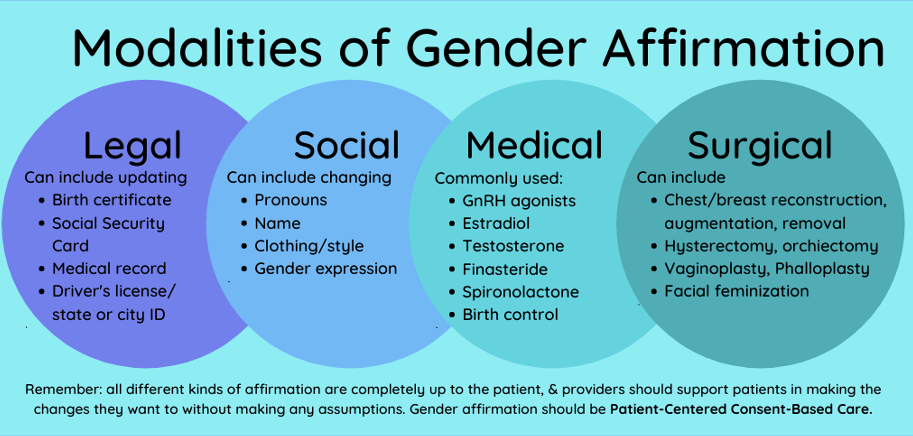
And I guess if it is dynamic through a person’s life. At what point would you say like, okay, then this would be a wise time to start hormone therapy or do like a surgery or something? Cause I know those are kind of where the rubber meets the road and I know it’s a hot button topic politically, but practically speaking in your own lived experience, because it is a lot easier and less expensive and less of a big deal to play with cosmetics and clothes and hair and stuff that you can try on. Like you said, draw a mustache on yourself in the bathroom and just see how it feels.
So at what point would be wise in your view to say, okay, I think I’ve settled on what this is going to be for me, and then how much of a period of time makes it worth it to invest money and time and potentially painful things to commit to something?
FG: I can certainly speak on this a little bit because I am going through a medical transition. I personally have been out as trans since I was 16. I first came out as agender nonbinary, and even after I came out as transmasc, not long after that, it took me until when I was 23 last year to medically transition.
I think the timeline is different for absolutely everyone. I’ve had dysphoria for my entire adolescent life, and just because I didn’t choose to transition earlier didn’t mean it was easier. It means that I had many a mental roadblock to get over.
I am an overthinker. I like to over-plan. I like to think through every possible outcome. It is both a strength and a flaw of mine. I think it comes in super handy and gets in the way all the time. And for me, it got to the point where it was just inevitable. I was running from it and I just had to take the next step.
I think for some people, they know inherently once they have access to the information that there is the possibility of things like hormone replacement therapy or puberty blockers or the various surgeries that you can get to have your gender affirmed physically.
Sometimes it’s very obvious and sometimes you do need the time to think and both are fine. There is no when this happens, that means that you know it’s time. That never happens for anyone that I’ve ever talked to. As many epiphanies as trans people have, as many aha moments that we go through, it’s never obvious.
It’s also hard to make the choice to do it, especially when there is pressure not to oftentimes from our culture at large—and sometimes trickling down into friends and family or teachers or peers. It can be really hard when you’re younger because you are told from a young age as a child that you don’t have the same rights as adults, that you don’t have the same autonomy, that your thoughts and opinions don’t hold as much value because you haven’t experienced the world yet. I know in I encountered that a lot as a young person; that my anxieties weren’t real, my sadnesses weren’t real, my lack of ability to find a home in myself wasn’t real because I hadn’t lived enough yet. It’ll just go away is what they love to tell us.
And just on the note of people going through phases, I think everyone goes through phases in every aspect of life. Going through a phase has become a really significantly looked down upon thing, which I find really interesting because I am not the same as I was when I was a teenager, and I am not the same as I will be when I’m 30, when I’m 40, when I’m 50.
AM: And thank goodness!
FG: No, truly, we learn and grow, and if you allow yourself to be challenged, and put in potentially uncomfortable situations, you have the opportunity to become a million iterations of yourself. And that’s one of the beautiful things about life, is constantly changing. And so I don’t think it’s necessarily a bad thing that you identify one way at one point in your life, another way in your next season and following that something different. I think that humans are really fluid creatures. And telling human beings that they can’t change, that they have to stay rigid and stoic is just another form of control. It is just another way to put you in a box and make you feel like you don’t have the power that you have.
AA: Thanks, Frankie. Yeah, that helps me understand more deeply. Thank you so much.
humans are really fluid creatures. And telling human beings that they can’t change, that they have to stay rigid and stoic is just another form of control
AM: Okay, I can just add there’s also that statistic that more people regret knee surgery than any kind of gender transitional procedure. Like, it’s okay, every trans person knows that this is what they need.
I mean, I’m a trans person who hasn’t really ever wanted or needed any kind of gender affirming physical care. I find myself very fortunate that I just have some natural androgyny going on. And it’s been at a point where it’s like, if something changes, I might consider that. Like I said, if for some reason in my mid-twenties my chest gets bigger, I might look into that. But I don’t know. Maybe I won’t. Maybe I’ll be like, yeah, I’m still non-binary and I can live with this…but also if I’m saying I can live with this, that probably means I don’t want to. I don’t know, there isn’t a single answer, it’s just a matter of like, let yourself feel what you feel, follow those feelings, and who knows?
AA: Wonderful. Thank you so much. Okay, let’s start talking about The Future Perfect Project that you both work on and then the podcast, which is called I’m Feeling Queer Today. So maybe you can take turns kind of telling me what it is, why there’s a need for it, and then tell me about some of the projects that go on there.
AM: The Future Perfect Project is basically this organization that goes out there and connects with queer youth and gives them means of expressing themselves, more or less, across creative mediums. Like, there’s the podcast cohort, I’m Feeling Queer Today. I also was part of a Performing Arts Intensive where we learned about performance and musical theater and that kind of thing. There’s also been writing workshops and animation workshops. It just kind of acts as this sort of haven for letting young queer people get the opportunity to not just explore storytelling, but also get concrete results. So I really feel like it manages to strike this really nice balance between being able to provide personal and also kind of professional resources for queer people, young queer storytellers, which I think is really important because a lot of us struggle in either one or both of those spaces.
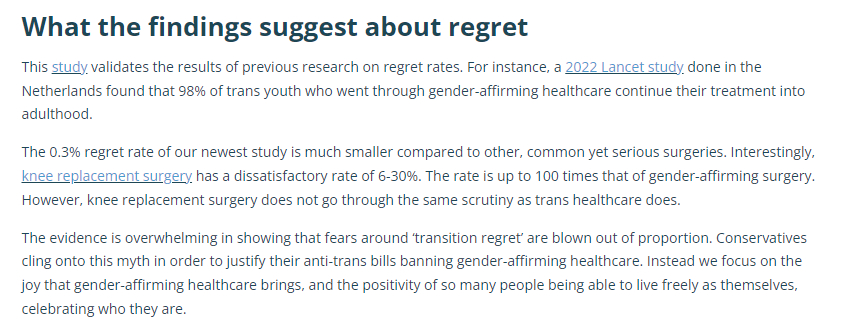
Like some of us have stories we want to tell but have no idea how to get it out there. Some people struggle to figure out how to tell those stories in the first place. And The Future Perfect Project has just been this really wonderful space that allows people to do that. They also have Future Perfect Records for young queer musicians. There are so many options and opportunities, and it’s just such an exciting, far reaching organization run by wonderful people who are doing what I find to be a really wonderful thing, especially with the current political climate, particularly in the U.S., but it’s not exactly all sunshine and roses up here in Canada either, so…
FG: I think touching on why there’s a need for The Future Perfect Project, Alex. You just briefly skimmed it: the legislation that’s going into place, not only in the U.S. where I’m from, but truly all over the world. It’s the one set of voices that’s really missing in the conversation that is primarily being had by adults is the youth that are being impacted the most. And I feel like The Future Perfect Project as a media production company is really important because it does allow for queer youth to get their own voices out there, to have the conversations that need to be had.
I know working on this podcast in particular, on I’m Feeling Queer Today, I got the opportunity to have some conversations that I’ve never quite had before and would have a really hard time having with even the older generation of queer people, let alone cis people that are putting these laws into place.
I think there’s so much talk of like, well, what if these kids do that? And what if it impacts that way? And what if their parents do that? And what if the doctors do that? And there’s nothing really super concrete about those statements that are being made because they’re not coming from the people that have the experiences of being young and queer and trans in particular. And that’s why The Future Perfect Project needs to exist. That’s why, I think more media companies like this should exist where the focus is on getting young people, not only the opportunity, but just the platform to run free and to tell their stories and to speak their truth. Because there’s nothing like hearing someone who’s close to your age or your age that looks or presents or expresses themselves like you telling a story that mirrors your own life.
I mean, I’m the oldest person in this cohort and still when I was an adolescent—I’m 24—when I was an adolescent, there weren’t stories of young trans people and it was hard to see myself in adult trans people because I didn’t know what that was like. I do now, and now I can relate. Now it’s pretty cool being able to see people my age and older tell their stories and live their lives, but at the time I felt so alone and so isolated because I thought I was too young to be having these problems…and I say problems because that’s how I viewed them at the time, not because that they are problems.
AM: When you don’t have the verbiage for it, it does kind of feel like a problem because I didn’t know that what I was feeling was dysphoria until I was well into my teens. And yeah, just being able to be in a space where young people can talk about these experiences…I think that if I’d had that younger, I would’ve figured myself out much younger.
And I also think that, again, I’m just coming back to this concept of empathy. It’s important for young queer people to have those stories being told, but I also feel like its empathy building for, like, sometimes the parents and guardians of those young people. Being able to be like, oh, okay, there’s someone like my kid out there. I just find that really important. I do still think that like the queer people benefit from it probably on a totally different level because it’s just that feeling of not being alone and realizing that like this is an experience that isn’t some problem.
It isn’t a problem. It’s something that can be beautiful and celebrated. But there’s also just the logistic thing of being able to, like, walk up to your parents (if it’s safe) and be like, “Here’s someone like me.” It acts as hope for every party involved. Like, okay, there is a way to be trans and happy. Cause I feel like that’s something that, even now, is still kind of inherently radical. In a world where so many of our stories are just defined by, like, I hate my body. I’m going to bind unsafely with duct tape because I hate my body. Like, I think it’s really important to have trans people who are happy. Who don’t—well, if they are binding, bind safely, I hope. Please bind safely, folks. My goodness. Please bind safely—but people who are able to express themselves and find happiness, whether it’s through gender affirming care or embracing their trans bodies and their means of presentation. There are just so many ways to be trans and happy. And queer, I guess, is what I’m saying. Queer and happy.
FG: Yeah, I feel like you and I keep coming back to being trans because that is the experience that we have, but all of this applies to being queer as well.
AA: And the whole project, The Future Perfect Project, including the podcast, I’m Feeling Queer Today, is for the whole the LGBTQIA+, for everybody.
FG: Absolutely, there’s a whole slew of different kinds of people on the podcast that talk about their experiences and I just want to point out again, like, Alex and my experience is limited to being white, AFAB, non-binary people, and that is a very, very, very slim portion of the entire community. So we can only represent our experiences through that lens and not other people’s. That being said, if you do want to hear about many more experiences, they’re on our podcast that is just waiting to be listened to.
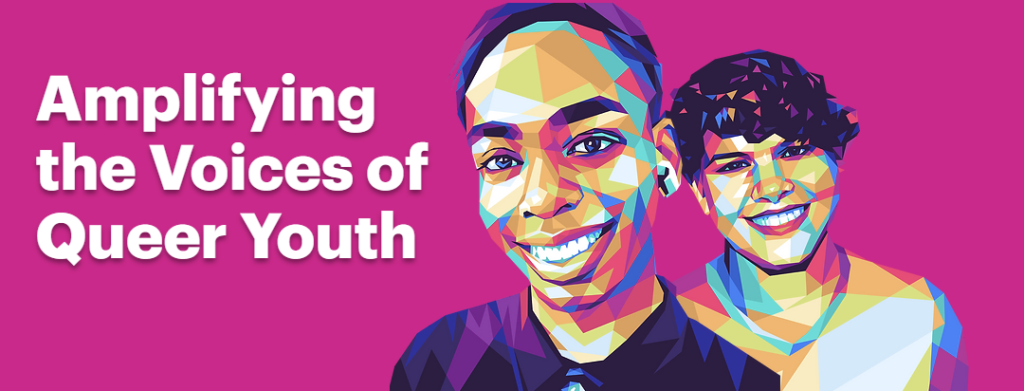
AM: Yeah, there’s this one kind of guideline that we went by in the series, and I think that this is Future Perfect Project wide, it’s this concept of speak from the I. Which is kind of acknowledging that your perspectives aren’t universal. There are probably people on the podcast who, if I sat down and tried to talk about labels with them, the way that we approach the same label could be straight up contradictory, or almost opposite. And that’s totally fine. That’s really cool, in fact. There are just so many different ways to experience things. I mean, even looking at Frankie and I, who are both white AFAB people, we have radically different experiences. So just imagine the full spectrum of lived experiences of young queer people.
There’s just so much range, and I find that really exciting, and that’s one of the really cool things about this podcast. We have people from all kinds of backgrounds who identify themselves in all kinds of ways. Some just don’t really label themselves at all. And that’s amazing.
AA: Okay, so tell me about some of the details of how it works. You mentioned, Frankie, that you were part of a specific cohort. So what’s a cohort, first of all, like, what does that mean exactly? And then I’d love you to tell me kind of the details of the podcast, how it works. How do you determine who’s the host of each episode, and what are you discussing, and do you seek guests on topics that you want to cover for the podcast, or do people come to you? What’s your listenership like?
So I’d love to just know some more details about how everything works and I just shot like five questions at you. Sorry.
FG: So to start off with the cohort question, what I mean by cohort is just in this season of the podcast, the group of people that have been working on it, on the second season, it is also the same group of people because we had so much media that we split it up into two seasons and that’s going to be coming out in September. But the first, the very first cohort was the first kind of trial run episode that Alex was a part of. I only joined for what is the first season, but the second cohort.
So that’s kind of just all I’m in, was like in this group of people. In terms of how we decide hosts and topics and things of the sort. Everyone kind of had free reign to make the segments that they wanted to make and talk about the topics that were important to them. And when there was crossover, people met up and had roundtable discussions or found folks outside of the podcast to interview.
I mean, I know quite a few of the segments I created were just putting an open call out to everyone in the group that we were working in. Here’s a couple questions I have, who wants to answer them? And then I would take all the audio I received from them and splice it into a segment that I thought was meaningful and important.
People had different ways of going about it, and we just made this giant collage of people talking and telling their stories with no rhyme or reason that turned into this really, really beautiful piece of art, truly. And in terms of choosing hosts, I think it was just whoever wanted to do it could do it. I think there were some last minute scrambles, there were some early decisions that stuck, and we just kind of made it all work.
AM: Yeah, like it’s all over the place. We basically just were like, here’s a platform to tell your stories. Here’s a little bit about audio storytelling and workshopping and interviewing. Go be free. Have fun.
AA: Wow. Okay, how are you funded then? Like, who pays for any equipment that you need?
FG: We were lucky enough to be supplied an app that does a really, really good job making your phone’s audio quality superb and we were all given the instructions on how to use it. And like Alex said, we were given a workshop on how to interview and all that stuff, how to hold the phone correctly and whatnot to pick up the best audio. And that was our equipment; we recorded on iPhones for the most part. I know there’s some segments that are just Zoom audio quality that just got enhanced. It really was DIY project.
AM: Yeah, what made it possible to be made in the first place because like The Future Perfect Project is… it’s not the kind of organization that can afford to fly us all in to a studio or something. Like, I’m Feeling Queer Today—it’s a little scrappy. It’s a little DIY. We got a bunch of queer youth together, talked about what we would want a podcast to be, and we just went off and made it.
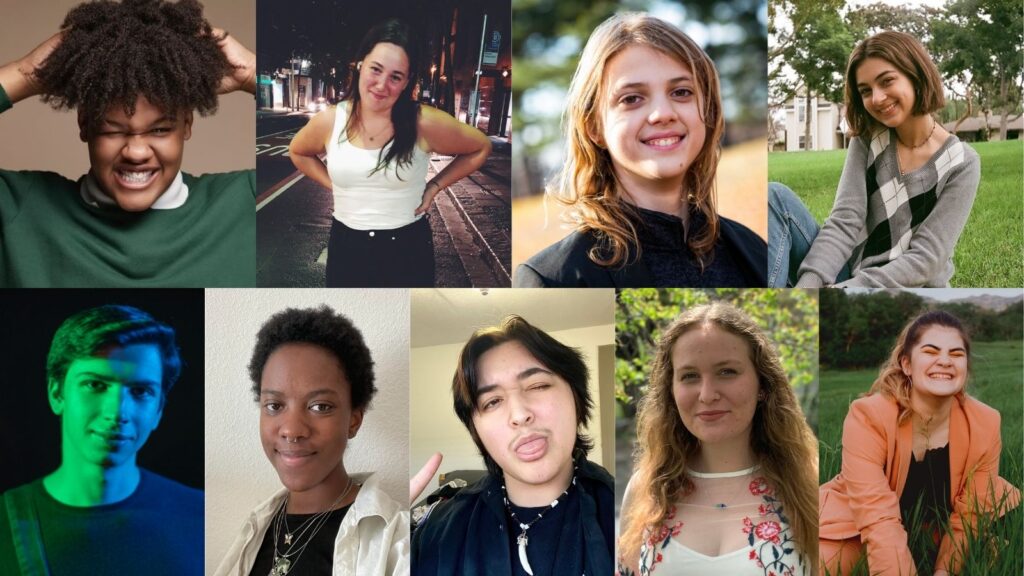
AA: Love it. Well, I can relate. That’s how I’ve done mine, too. Okay, so on that topic, and we have maybe time for two more questions.
One of the things I wanted to ask you is, I think you referred to this a little bit earlier, Frankie, about just the generational differences, even in the queer community, between younger kind of Gen Z and then older generations, millennials and Gen X and even older than that. I guess the way I’ll phrase the question is just, can you talk about a little bit of the contribution that the older generation has made that you felt in your life? And then what you think the contribution is of the younger generation?
FG: The reason that I can be out and proud the way that I am, the way that I can present, the way that I have access to medical care that I need is because of my queer elders. I stand on their shoulders, and I thank them for everything that they’ve done.
So much work has been put into queer and trans liberation that was long before I was ever alive. Long before I was ever a conscious human adult. And without that, I would not have the opportunity or access that I do. What haven’t they done? Really, truly. Obviously, there are differences between our generation of queer folks and older generations, in part due to technology and smartphones and just access to information. But I think even the people that have not caught up yet, because no, not everybody needs to—and by caught up yet, I mean vocabulary and lingo and newer concepts that are being more widely spread nowadays because it’s safe to. And the only reason that it is safe to is because of the people that have come before us that have worked so hard to make this world a safer, more sane place for us.
We’re the youth. We’re what they’ve been working so hard for, and it is only fair that we pick up the torch and continue for people younger than us because progress is only made slowly. It’s not a fast process. It is intergenerational. And in terms of what youth contribute. I mean, again, we’re all working together just from different angles. I feel like young people are here for vitality and new ideas and problem solving. And again, telling their experience and expanding vocabulary and concepts and adding more nuance to the world and more beauty.
And I think without both sides—without both the respect needed to be given to our elders and respect to the youth who are trying their damn hardest in this really, really difficult world—you just lack a full picture. There would be no queer community without either.
AM: Beautiful. Yeah. No generation exists in a vacuum. And that’s a beautiful thing. I just find that really wonderful. That we have the privilege to be able to look back on even some queer history. Because God knows that they tried to erase it—and unfortunately succeeded in a lot of ways—but it’s still there. Both in actual recorded history and in the fact that we are, as Frankie said, allowed to be safer than they were.
I think that queer people are a group that are immensely conscious of how things change and so on. I think that it’s because of how we have to seek each other out and we have to seek that community out. So, a lot of that does come with this active awareness of the safety or lack thereof, if that makes sense. Like, yeah. I find that a lot of queer people, unfortunately, it takes a while for them to meet another queer person or even be introduced to the concept of queerness and the fact that, like, we have to seek that out often means I feel that we are very conscious of how things change over generations and stuff and maybe in this generation it’s a bit easier for us to find that information in that community but I hope that that’s not at the cost of realizing what came before and our ability to respect and acknowledge that.
AA: Wonderful. Okay, last question—and it has two parts and you can answer either one first. Just thinking about people who are listening to this or watching right now, I’m thinking of kind of two different communities. So what would you say to any listeners or viewers who are queer and aren’t out yet, what would you say to them?
And then the other community that I’m picturing listening or watching is maybe cisgender heterosexual people who are in the beginning stages of allyship, who are listening and like maybe dipping their toes in, they want to be good, kind people, but maybe they’re unsure how and they’re feeling new. So, what would be kind of your advice or your hopes for each of those groups of people?
AM: Do we want to do the first group and the next group, Frankie, kind of back to back?
FG: Yeah. Sounds good.
AM: You can start.
FG: All right. Well, to folks listening that aren’t out yet, that are in the process of doing their questioning on the beginning of their journey, I think the most important thing is that you don’t rush, you figure it out in the time that it takes.
The first person you ever come out to is yourself, and that is a really, really difficult process. And if you’re not ready to do that, if you have an inkling but you’re not ready to admit that yet to yourself or to other people, that’s okay. If you’re not safe, if it’s because you’re unsure, if it’s because it’s confusing as hell. That’s great. That’s part of the journey. And eventually, at some point in your life, I hope you look back and appreciate the care and kindness that you’ve given yourself to take the time that you need. And you’ve got to be nice to yourself. You’ve just got to be kind and forgiving because it’s hard especially when we live in a scary, scary world.
It’s okay to feel however you’re feeling. The experience of being a queer or trans person, it’s complex, and there are multitudes to it. There’s joy, there’s sometimes sorrow, and whatever you’re feeling is okay. And it’s okay to just let yourself feel those feelings. Just play, enjoy where you can, where it’s safe.
AM: Yeah, just being able to find joy and play where it’s safe and where you can go a long way. And it’s okay if you don’t immediately find your answer. Lord knows that a lot of us didn’t. Like Frankie said, the first person you come out to is yourself. And even that can be terrifying. And that’s okay.
And you’re not alone. That’s a promise. Sometimes it feels like you’re the first person to ever feel that kind of pain, but you’re not. A lot of us have felt that, but there is a beautiful community out there, and it’s always been there, and it always will be there, no matter what anyone tries to do about it. And if you discover that you’re a part of it, you will be welcomed with open arms.
there is a beautiful community out there, and it’s always been there, and it always will be there
AA: Then before we go into the next part of the question, actually, would you share the resources that are available to the organizations that you work with and then if you have any other organizations that you would recommend to find that solidarity in the community?
AM: Yeah, one resource that we continuously come back to—partially because of Celeste’s connection to it, AKA co-founding—is the Trevor Project, which is for people between the ages of 13 to 24, and it’s LGBTQIA+ specific support, and I believe that you can text or chat, and I believe the number is 1-866-488-7386. That is 1-866-488-7386.
AA: That’s great. Yeah, I would add too even just the website of The Future Perfect Project and where they can find your podcast would be great too.
AM: Yeah. The Future Perfect Project is available at thefutureperfectproject. org and it has links to our podcasts and other media projects and our social media and also information about workshops and internships for queer youth.
AA: Amazing. And then I’m Feeling Queer Today, what platforms can we find that on?
AM: Anywhere that you can find podcasts.
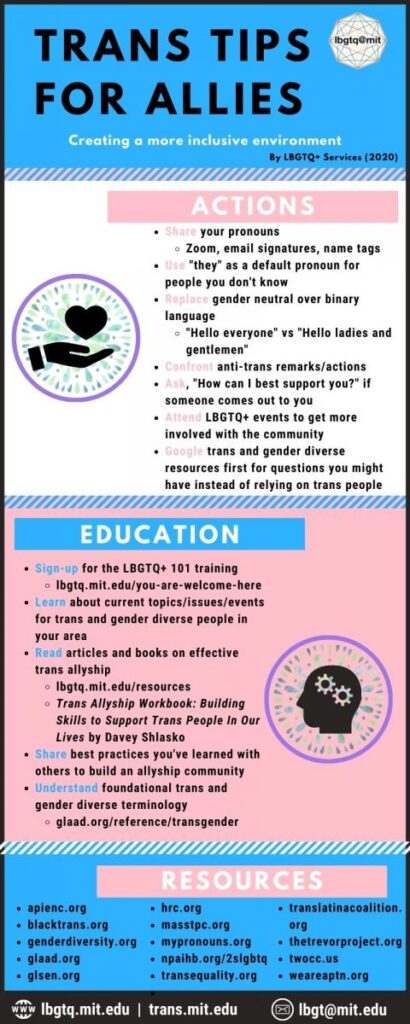
AA: Sweet. Love it. Wonderful. Thanks for sharing that. So back to kind of the other question that I asked. How about people who are wanting to be allies and maybe are feeling either intimidated or they’re nervous to ask questions, what advice would you give to them or what are your hopes for them?
FG: I understand the hesitation to ask questions. I would say ask away as long as you’re approaching it with respect. And you’re not being invasive and you’re not demanding education from queer people, if you are coming from a place of compassion and empathy and a willingness to learn and be open, questions are great. Don’t expect queer people to just answer them for you.
I know when I’m having a bad day, the last thing I want to do is launch into an explanation that I’ve given a thousand times. But if you know queer people, if there’s a comment section on the internet that you’re comfortable in, please and you just want to know something, it’s worth asking.
There’s also literature that can be found, there are articles on the internet. Google is a really great place to ask questions. Sometimes, it is worth throwing in a Google search before asking your person…but there is also a lot of nuance lost in that. And therefore, I think both resources are incredibly important. Again, there is literature to be found.
AM: And on top of that, you might find some answers are contradictory to answers you’ve heard before, and that is okay. Like, if you know one trans person, you only know one trans person. That’s a thing that a lot of people say about a lot of other things. We are not a monolith.
Some of us might be more open to answering questions. Some of us might have gotten tired of answering the same questions a million times, and some of us might even be skeptical of well-meaning allies because some people have been burned in the past. And that’s a sad truth, but it is a truth.
And once again, I’m just coming back to empathy and having empathy and kind of keeping in mind that being trans is kind of stressful right now. Being queer in general is really stressful.
FG: Being queer in general is like really stressful right now.
AM: On both sides of the border, we’re not having a great time. Not even to mention outside of the U.S. and Canada, we’re not having a blast. But yeah, trans people aren’t a monolith. You might get the same question answered different ways by different people. You might have people who are more open to answering your questions, and others who are less into answering your questions.
There’s, like, no simple prep way to be an ally who doesn’t mess up, but I feel like if your heart is in the right place and you’re committed to helping queer and trans people, then I don’t know…I feel like that says a lot, and that speaks volumes, and that’s unfortunately more than a lot of people will be doing, because a lot of people just kind of like to pretend we don’t exist, so we appreciate it, even if sometimes we don’t have the capacity to hold your hand, for lack of a better phrasing.
We appreciate the intentions, and it’s okay if it’s a little bit of a rocky road, and sometimes you don’t have the answers, or we don’t have the answers. We all want the same thing and that’s just a safe place for queer people.
FG: The most important thing is just to listen. Just listen without judgment and be ready to deconstruct ideas that you’ve been taught.
Get ready to unlearn some stuff that is not necessarily helpful and possibly harmful. As well as just like, if you’re so worried about being a good person, you’re going to not have as much space to move through the world in a kind and compassionate way. So mistakes happen and people mess up. We’re all human. There is no perfect ally.
AM: You will mess up. We will mess up. Everyone will mess up. That’s okay. You will learn and you will grow. And, again, there might not be a single answer to the question you have, and that’s okay.
AA: That’s wonderful. And what I’m hearing from that, too, is…I mean, it turns out that both questions that I asked overlap in the answer of listening to your podcast, because what I’m gathering is, even though maybe the target audience for the podcast might be queer youth and building community and solidarity and validation and support in the queer community. But someone else listening, as you have pointed out, as you both have, would gather this much more enriched and deep and complex and nuanced understanding of the whole landscape of what it means feels like to step into lots and lots and lots of different people’s shoes.
And that way, as you said, no one person is having to explain it a thousand times. That’s one of the points of writing a book and putting it out there, or doing an episode and talking in a microphone that hits a lot of people at the same time, is then you don’t have to explain it for each individual person. So thank you. Thank you so much for the work that you’re both doing.
I am so impressed with both of you and so grateful. I learned so much from you today and I’m just really, really excited about what you’re doing and wish you both the best. Thank you for being here.
AM: Thank you for giving us this space. I just love digging into this.
FG: Yeah, I’m sure Alex would be able to say, we could talk about this stuff unending. Like this could go on forever. So thank you for giving us the space to talk about it even more. Because apparently one podcast wasn’t enough.
AM: I hope that this resonates with people. Whether they’re in that first group, or that second group, or a whole other group, I just hope that people come away from this feeling better in some way or another.
FG: Absolutely. I second that.
AM: You’re not alone. You’re doing great and we love you.
I really wish for cis people that they experience the gender euphoria that trans people get
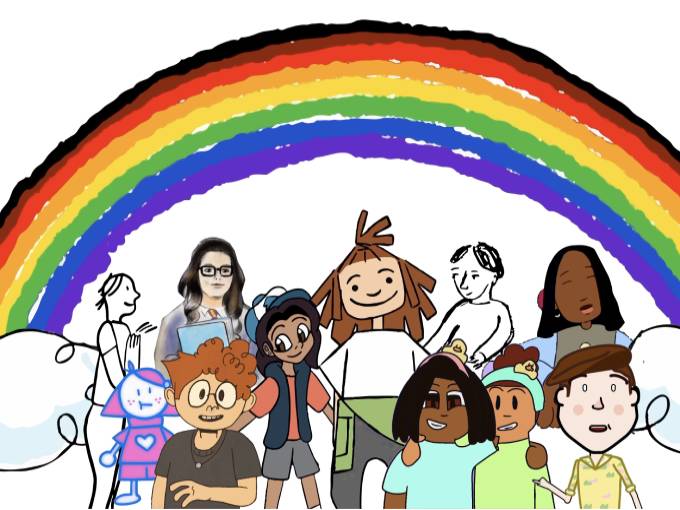
through that journey of self-expression and curiosity
Listen to the Episode
&
Share your Comments with us below!

